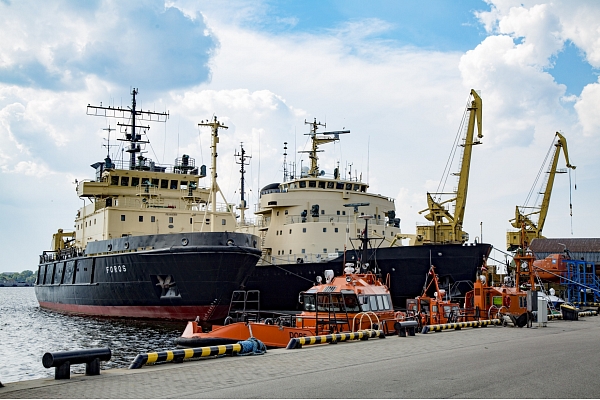Despite challenges, exporters hold their ground
In 2016, Latvia exported EUR 10.332 billion worth of goods to foreign countries, down 0.3% or EUR 30.9 million from 2015, while imports dropped 1.7% or EUR 212.9 million to EUR 12.279 billion. For exporters, last year was full of challenges, considering falling prices for raw materials, the decline of the Russian ruble and the British pound sterling as well as reduction of exports in certain categories of goods related to re-export. These factors slowed down the growth of Latvian exports of goods in 2016 but the export value practically stayed at the 2015 level, dropping just 0.3%.
A 5.2 % decrease in exports to Lithuania, mainly due to shrinking re-export of mineral products, had the biggest negative impact on Latvian exports last year. Exports of goods to Russia kept falling for the second year in a row. In 2016, exports to Russia fell 5.9% with decreases recorded in practically all categories of goods. Russia's share in total Latvian exports of goods shrank to 7.6%. Exports to other CIS countries decreased 3.5% last year. This downward trend was offset by rising food sales in Germany, sales of timber and wood products in Sweden, export of iron and steel products as well as furniture to Denmark and sales of means of transport and timber in Estonia.
Despite the steep drop of the British pound sterling following the Brexit referendum in June 2016, Latvian exports of goods to the United Kingdom rose 9.9%, picking up the pace in the second half of the year due to an increase in export of timber and wood products, the Economics Ministry said.
In 2016, Latvia was one of the six EU member states in which exports remained at the same level as in 2015, according to the Eurostat data published on February 15, 2017.
According to Eurostat, export levels last year remained unchanged in Latvia, Austria, Belgium, Denmark, the Netherlands and Sweden. Six other countries reported a drop in exports – the UK (-11%), Luxembourg (-8%), Finland (-3%), Lithuania and Greece (-2% each) and France (-1%). Imports in 2016 dropped year-on-year in nine EU member states, including Luxembourg (-7%), Lithuania (-3%), Belgium and Netherlands (-2% each), and Latvia, Bulgaria, Italy, Ireland and Spain also reported a 1% drop in imports each.
Top export products...
The Top 10 of Latvian export products has been the same for several years already and comprises timber, telecommunications, sound recording and reproduction equipment, wood products, metal products, beverages, oil, oil products, grain and grain products, means of transport, materials of animal and plant origin, electric equipment and their parts.
… and top export countries
Latvia’s main trade partners in 2016 were Lithuania (17% of total foreign trade turnover), Estonia (10%), Germany and Poland (9% each), Russia (8%), Sweden (5%), the Netherlands, Denmark and the United Kingdom (4% each), and Finland (3%). In recent years the foreign trade balance with Estonia has stayed at around 10% while trade with Lithuania worsened slightly in 2012-2013, mostly due to higher imports of mineral products and agricultural and food products. But, starting with 2014, global oil and food prices went down, and the import value of those products fell steeply, significantly narrowing the trade gap with Lithuania. The main categories of products in foreign trade with the two neighboring Baltic states are agricultural and food products, machinery, electric equipment and chemical products.
Export and import of services
During the economic crisis, export of services decreased less than export of goods. In 2011-2012, export of services showed steady growth, just like export of goods. Surplus of services offset 64% of the goods trade deficit in 2012 and already 70% in 2013, as the goods trade balance improved significantly. The trend continued also in 2014-2015 with surplus of services covering 77% and 84% of the goods trade deficit respectively, and in the first half of 2016 it was 89%. Income from transportation services makes up about 40% of services exports. The year 2016 was not very good for the transport sector and its exports decreased somewhat. Exports of road haulage and rail transportation dropped but growth in export of transportation by sea and air compensated for this drop. Half of Latvia's total export of services goes to the EU member states. Export of services to the EU member states showed stable growth in 2015 and in the first half of 2016 – by 10.4% and 24.7% respectively. Travels, road haulage and transportation by sea make up the biggest share of services export to the EU member states.
Competitiveness, value added of goods must be boosted
Bank economists expect the decline of export prices in the EU to stop in 2017 and the export value to climb back into the positive territory. Growth in Europe will be steady and foreign demand will increase accordingly, allowing for faster export growth. Regretfully, the threat of protectionism in the world is increasing and may restrict growth of exports. In order to ensure export growth it is vital to increase competitiveness by expanding into new markets and boosting value added of the Latvian export products. Unexpectedly strong improvement in exports and manufacturing industry performance in the last months of 2016 does not seem to be a random deviation but rather directly reflects improvements in external economic environment. One of the factors is that the economic sentiment indicators in the United States and the euro area have reached the highest level in the past 10 years, regardless of different political shocks, and suggest a very stable growth in the two economies. The other factor is the Russian economic which is showing signs of stabilization and return to positive growth. In December 2016 Latvian exports to the CIS countries already increased 16.7%. The third factor is developments in global trade which has started returning to positive growth after the decline that lasted for more than a year.
Exporters face challenges
In the coming years the global economy will be facing great challenges created by political changes and growing support to the protectionist ideas, experts said during the forum "Import. Export. Development" in Riga in February this year. Cross-border trade and international investments are of critical importance for creation of new jobs and improvement of living standards. Experts said that reduction of jobs was being blamed on globalization, although in fact this should blamed on technologies and automation. More opportunities will open for Latvian companies this year due to several new international agreements: the EU-Canada Comprehensive Economic and Trade Agreement (CETA), the World Trade Organization's (WTO) Trade Facilitation Agreement, which, once ratified, will allow for easier access to the markets of the 164 WTO member states, and the expanded Information Technology Agreement (ITA) that would lower the customs duties for 90% of IT products.
At the forum experts also noted that the EU stance on relations with Russia remained strict therefore no major improvements in economic relations with the neighboring country should be expected this year. According to the Baltic section of PwC CEO Survey, only for Latvian companies the Russian sales market is still vital for their business growth while Scandinavian markets – Sweden and Finland – are vital for both Lithuanian and Estonian companies.
However, after losing one market, the Latvian companies have demonstrated remarkable flexibility by quickly switching to several new markets. Exports to South Korea, India, the Gulf countries, Central Asia and the EU have increased in recent years. Fish canneries, food producers and logistics companies have successfully adjusted to the new situation.
According to PwC CEO Survey, Baltic CEOs share concerns about over-regulation, the increasing tax burden, and geopolitical uncertainty. But the most alarming trend in terms of business threats is that Latvian CEOs are significantly concerned about bribery and corruption as well as the lack of trust in business. At the same time, four out of every five Latvian CEOs participating in the survey believe that building an internationally competitive and effective tax system should be at the top of the list of the government's priorities.
Winners of The Red Jackets export excellence awards boast 53% growth of turnover
The companies which had received the export excellence awards from The Red Jackets export support movement have increased their turnover by 53% over the past year. Among the ten companies, which received the title of Latvia's Rising Star in Export from The Red Jackets in the previous year, the most impressive growth has been demonstrated by toy blocs manufacturer GiGi bloks (by 240%), data visualization company Infogr.am (by 201%), producer of energy efficient lighting devices Vizulo (by 112%) and producer of breakfast cereals Milzu! (by 93%). Among the export brands, the steepest growth was recorded for NPK Expert, the producer of mineral fertilizers, Nordic Plast , which is one of the leading waste recycling companies in the Baltics, and Mikrotīkls, the maker of electronic communications systems, which each showed turnover growth in the range between 40% and 50%. The companies for which Russia was one of the key trade partners are still struggling, for example, dairy company Food Union and fish cannery Karavela, which had been affected by the Russian embargo but could not find new markets quickly.
The Red Jackets export support movement was established to create a platform for united and inspiring message about Latvia's export brands that would help them to be more recognizable and stronger. The movement intends to produce the Top 100 of Latvia's best export brands by the country's centenary to be celebrated in 2018.
Chamber of Commerce export excellence awards go to Mikrotik and Lat Eko Food
The Latvian Chamber of Commerce and Industry handed its Export Excellence Award 2016 to software developer Mikrotik but the Spriditis Award which is granted to a new innovative Latvian company with great export potential this year went to organic food producer Lat Eko Food. In order to be nominated for the Export Excellence Award, a company must have at least 51% of Latvian capital in its share capital, export its products to at least five countries or export at least five products, export an innovative product with export turnover of at least EUR 700,000, or must have entered three new export markets. Three companies were nominated to the award in 2016 – specialized equipment producer Peruza, vertical wind tunnel producer Aerodium and software developer Mikrotik. The Spriditis Award is for new and successful small businesses, which have been established no longer than five years but have demonstrated at least a 50% growth of exports or export three products, or have generated over EUR 150,000 in export turnover. The nominees to the Spriditis Award in 2016 were handbag maker 3 wind knots, manufacturer of bicycle covers Velosock and organic food producer Lat Eko Food. Just like in previous years, the best of the Latvian exporters to receive the awards were picked by the Export Council of the Latvian Chamber of Commerce and Industry.





